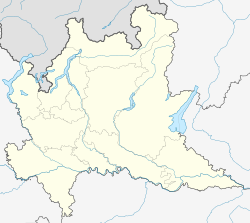Gorno
Gorno Góren | |
|---|---|
| Comune di Gorno | |
 Gorno | |
| Coordinates: 45°52′N 9°50′E / 45.867°N 9.833°E | |
| Country | Italy |
| Region | Lombardy |
| Province | Province of Bergamo (BG) |
| Frazioni | Riso, Chignolo, Erdeno, Campello, Sant'Antonio |
| Area | |
| • Total | 9.9 km2 (3.8 sq mi) |
| Elevation | 710 m (2,330 ft) |
| Population (Dec. 2004)[2] | |
| • Total | 1,760 |
| • Density | 180/km2 (460/sq mi) |
| Demonym | Gornesi |
| Time zone | UTC+1 (CET) |
| • Summer (DST) | UTC+2 (CEST) |
| Postal code | 24020 |
| Dialing code | 035 |
Gorno (Bergamasque: Góren) is a comune (municipality) in the Province of Bergamo in the Italian region of Lombardy, located about 70 km (43 mi) northeast of Milan and about 25 km (16 mi) northeast of Bergamo. As of 31 December 2004, it had a population of 1,760 and an area of 9.9 km2 (3.8 sq mi).[3]
The municipality of Gorno contains the frazioni (subdivisions, mainly villages and hamlets) Riso, Chignolo, Erdeno, Campello, and Sant'Antonio.
Gorno borders the following municipalities: Casnigo, Colzate, Oneta, Ponte Nossa, Premolo.
Physical geography
[edit]Territory
[edit]The municipality is located in the lower part of the Val del Riso, a valley that starts east of the Colle di Zambla and descends opening westward, flowing into the wider Val Seriana. The territory draws an irregular geometric profile, with very pronounced elevation variations. The altitude of the municipal territory ranges between a minimum altitude of 475 m a.s.l. in the locality of Centrale (at the entrance of the town) and a maximum altitude of 1,775 m a.s.l. in the locality of Preda Balaranda, with a difference in altitude of 1,300 m[4] characterized in the upper part by a very wide and suggestive panoramic opening offered by the surrounding Orobic mountains.[5]
The municipality of Gorno covers 9.87 km² and borders the municipalities of Ponte Nossa, Premolo, Oneta, Casnigo and Colzate.[6]
According to the civil protection seismic classification, it is in zone 4, i.e., subject to very low seismicity.[7]
Demographic evolution
[edit]
References
[edit]- ^ "Superficie di Comuni Province e Regioni italiane al 9 ottobre 2011". Italian National Institute of Statistics. Retrieved 16 March 2019.
- ^ "Popolazione Residente al 1° Gennaio 2018". Italian National Institute of Statistics. Retrieved 16 March 2019.
- ^ All demographics and other statistics: Italian statistical institute Istat.
- ^ "Clima e Dati Geografici". Retrieved 5 December 2012.
- ^ "Descrizione territoriale". Retrieved 25 December 2012.
- ^ "Paesi confinanti". Archived from the original on 4 March 2016. Retrieved 5 December 2012.
- ^ "Classificazione sismica". Retrieved 5 December 2012.


 French
French Deutsch
Deutsch

